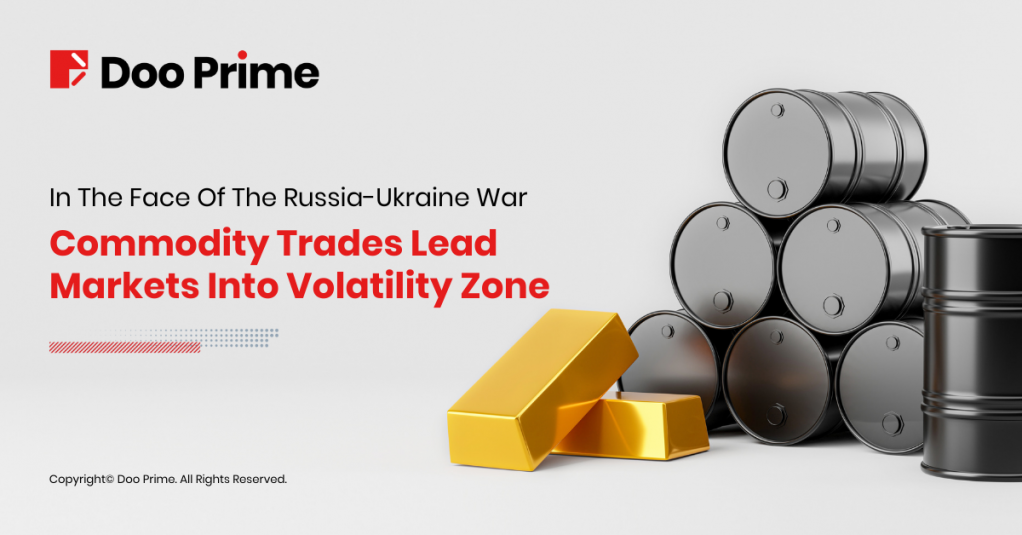
As mentioned, the world is watching as the Russia-Ukraine war continues. In our previous article, we covered how the global markets and economy were affected in general. But this is not the only market that is affected. Another financial product and industry to keep an eye on is Oil & Gas.
In-Depth Analysis On Energy And Commodity
With this, Doo Prime’s in-house analyst, James Gomes, who has been in the finance industry for over 30 years, has put together his market commentary on the fluctuating oil market.
Obviously, Russia’s invasion in Ukraine has affected markets. The invasion is now 8 weeks old and more or less priced into the markets.
Nevertheless, here are my thoughts. :-
Not to take away the human tragedy that has unfolded in the weeks since the invasion, when it comes to markets there are 2 main effects.
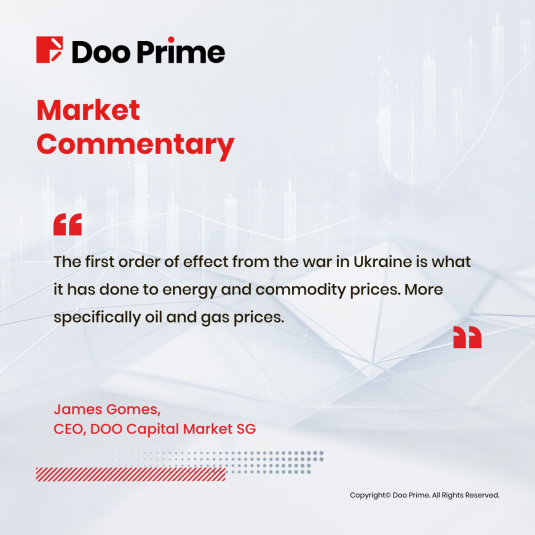
The first order of effect from the war in Ukraine is what it has done to energy and commodity prices. More specifically oil and gas prices.
Inflation had been on the rise before the war started and now the invasion has added to it. Adding to this, the rise in food and energy prices and supply chain disruptions have added to inflationary pressure around the world.
Also, the recently released inflation numbers in the U.S., at multi-decade highs, are driving the Federal Reserve to be more aggressive in the reduction of its balance sheet and rate hikes.
And the rise in bond yield reflects the recent posture of the Fed.
Coupled with the fact that corporate forward earnings are now being tempered by the effects of the war, there are more calls from economists for a possible slowdown in the U.S. economy.
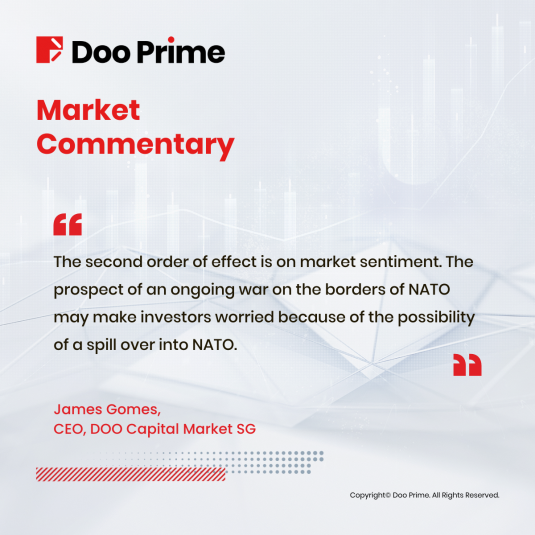
The second order of effect is on market sentiment. The prospect of an ongoing war on the borders of NATO may make investors worried because of the possibility of a spillover into NATO.
Don’t get me wrong, war anywhere is not a good thing. A war that includes Russia is bad. A war that includes Russia that may spill into NATO is really bad.
The unpredictability of Putin will be at the back of investors’ minds as anything could happen.
As the war progresses, the market seems to feel that it will be contained within the borders of Ukraine and has eased the worries somewhat.
More so in the U.S. where the effects of the invasion seem far from its borders and less so of a worry compared to Europe.
The fact that the U.S. stock market bottomed out on the day of the invasion seems to suggest that the strength of the U.S. economy is able to withstand this pressure.
The caveat is that the war does not unfold into something worse like nuclear weapons being used and of course spilling over into NATO territory.
For now, markets in the U.S. are more focused on the rise in bond yield and the change from easy money to a slightly tighter Fed with a possibility that it might run into a recession as early as next year.
If markets are comfortable that the Fed will control inflation without damaging the economy, and the economy is strong enough to handle rising rates, the U.S. markets may be in for new highs.
How Does The Sanctions On Russia Affect The Oil & Gas Market
The Russia-Ukraine war has led to worries over supply disruptions as a result of U.S. sanctions on Russian oil and gas. The U.K. and European Union also said they would phase out Russian fossil fuels.
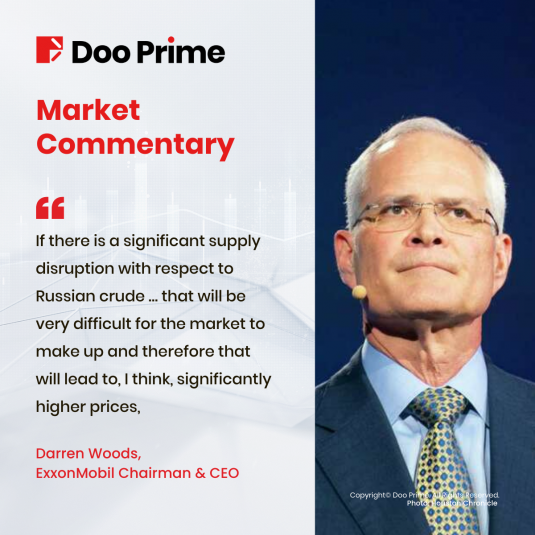
In fact, Russia supplied 11% of global oil consumption and 17% of global gas consumption in 2021, and as much as 40% of Western European gas consumption in the same period, according to statistics from Goldman Sachs.
As sanctions on Russia intensified, some companies became reluctant to purchase Russian crude. This has led to oil and soft commodity prices being sharply higher. With this surge, Brent crude was trading above $110 for the first time since 2014, on 2nd March 2022.
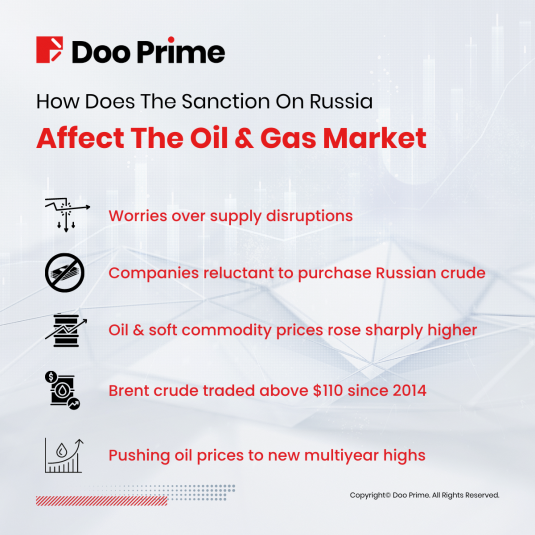
Looking forward, the market focus should not only be on whether the oil sector will be directly targeted by sanctions, but also on the crescendo effect of self-sanctioning.
Fears over energy sanctions and the ambiguity over the banking sanctions have already seen companies avoid purchasing Russian barrels, pushing prices to new multiyear highs and shaving-off shock mitigation policies such as the SPR releases.
Also, it has become clear that traders holding Russian crude on their books are struggling to clear cargoes and this has been reflected in widening differentials and rising shipping and insurance costs.
Commodity’s Performance During The Interval
Here, we take a look at how crude oil ushered in historic volatility since the Russian-Ukrainian war hit the global financial market.
The price of Brent crude – the global benchmark for oil prices – rose to around $130 a barrel on 7th March 2022, following reports that the U.S. and U.K. will announce their own ban on Russian oil imports.
“The breakdown of peace talks between Russia and Ukraine saw crude oil prices extend their rebound,” ANZ Research analysts Brian Martin and Daniel Hynes wrote in a note. “However, it failed to offset the losses earlier in the week, with Brent crude ending down more than 4%.”
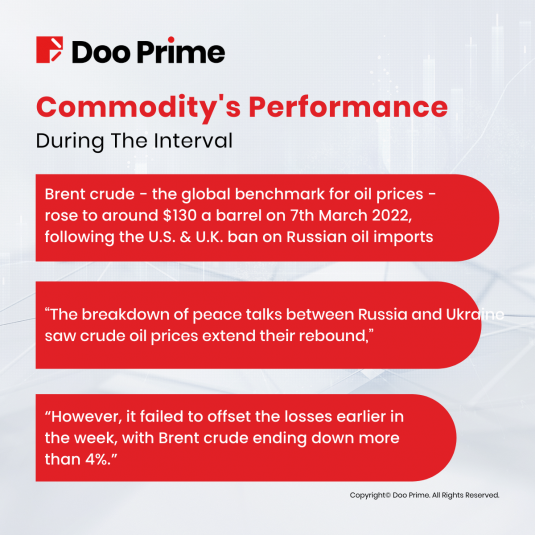
In addition, Russia has said it may close its main gas pipeline to Germany if the West goes ahead with a ban on Russian oil.
Deputy Prime Minister Alexander Novak said a “rejection of Russian oil would lead to catastrophic consequences for the global market”, causing prices to more than double to $300 per barrel.
While the U.K. would not be directly impacted by supply disruption, as it imports less than 5% of its gas from Russia, it would be affected by prices rising in the global markets as demand in Europe increases.
Vladimir Putin has signed a decree stating buyers “must open rouble accounts in Russian banks” from 1st April 2022. Mr Putin’s demand is being seen as an attempt to boost the rouble, which has been hit by Western sanctions.
His decree means foreign buyers of Russian gas would have to open an account at Russia’s Gazprombank and transfer euros or U.S. dollars into it.
Vladimir Putin has outlined a pathway for the cutting of gas supplies to Europe if Western customers refuse to pay for supplies in the Russian currency the rouble.
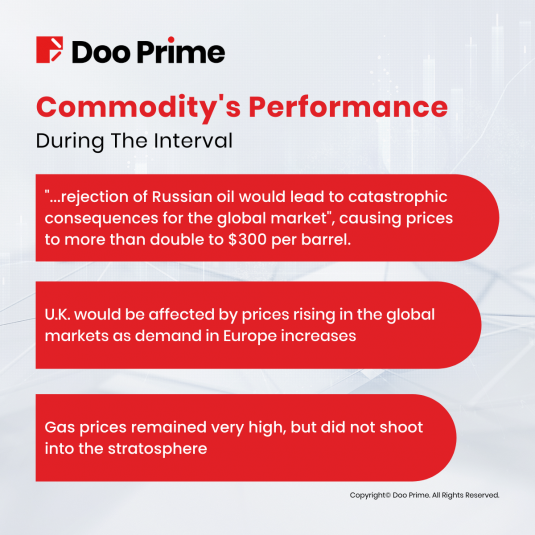
However, the market reaction suggests the details of the mechanism mean that, in practice, European customers will just have to change their currency dealers to Gazprombank.
At this point in time, that bank has already been left unsanctioned by the EU, for the purpose of continuity of energy trade. As a result, gas prices remained very high, but did not shoot into the stratosphere.
In the current environment of ever-rising tensions, one should not exclude the possibility that in an escalation situation where Russia struggles to clear its barrels, weaponizing energy becomes the next chapter in Russia’s ongoing standoff with the West.
Tune in to our next post to see how the gold fluctuations during this on-going crisis can influence your trades.
Disclaimer
This information is addressed to the general public solely for information purposes and should not be taken as an investment advice, recommendation, offer, or solicitation to buy or sell any financial instrument. The information displayed herein has been prepared without any reference or consideration to any particular recipient’s investment objectives or financial situation. Any references to past performance of a financial instrument, index, or a packaged investment product shall not be taken as a reliable indicator of its future results. Doo Prime makes no representation and warranties to the information displayed and shall not be liable for any direct or indirect loss or damages as a result of any inaccuracies and incompleteness of the information provided. Doo Prime shall not be liable for any loss or damages as a result of any direct or indirect trading risks, profit, or loss associated with any individual’s investment.



